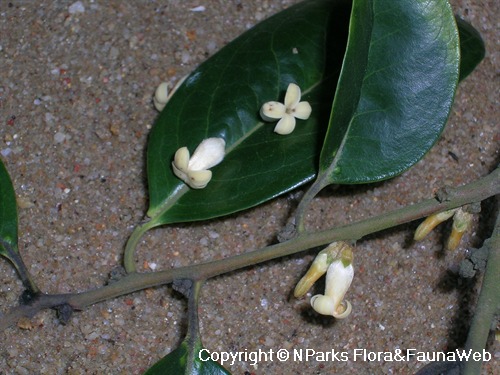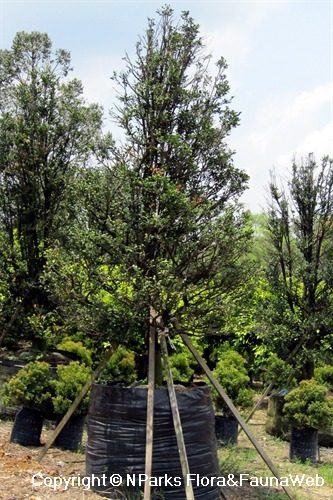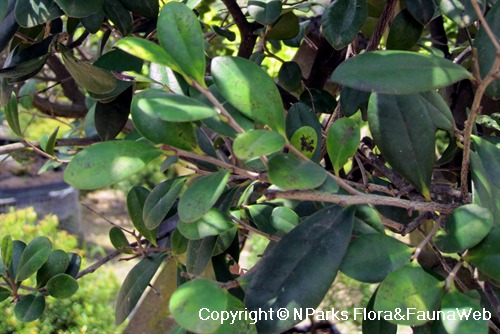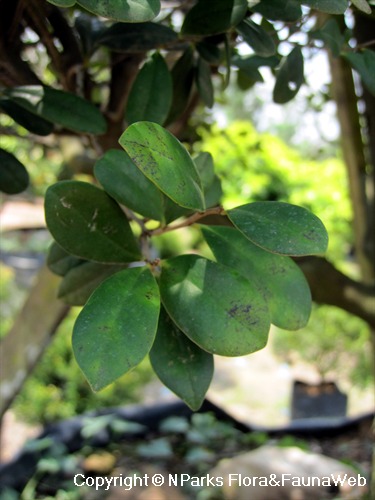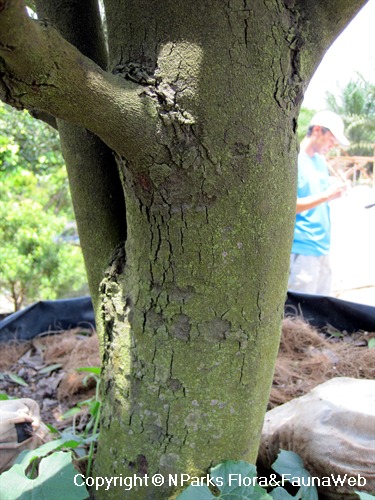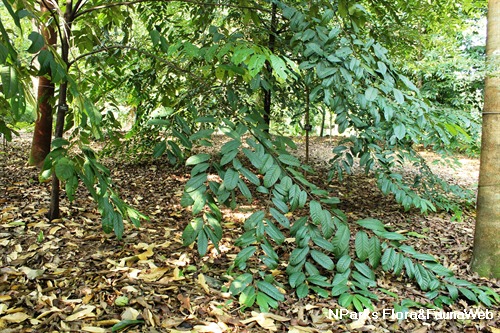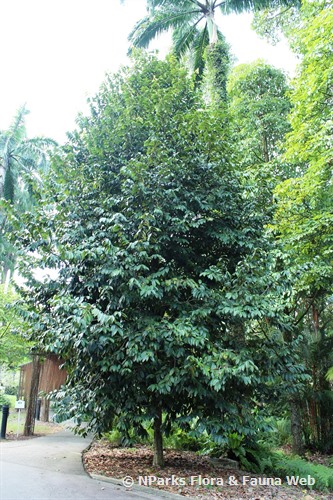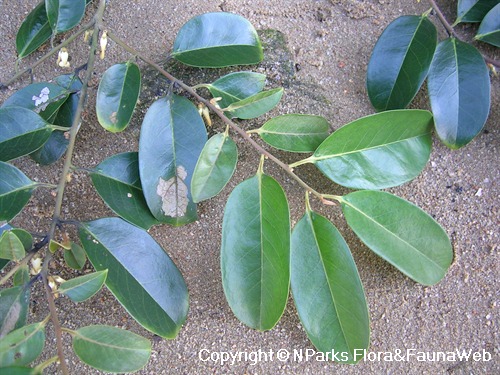
Back
Diospyros ferrea (Willd.) Bakh.
| Family Name: | Ebenaceae |
| Common Name: | Sea Ebony, Sechirik Laut, 象牙树 |
Name
Classifications and Characteristics
| Plant Division | Angiosperms (Flowering Seed Plants) (Dicotyledon) |
|---|---|
| Plant Growth Form | Tree (Small (6m-15m)) |
| Lifespan (in Singapore) | Perennial |
| Mode of Nutrition | Autotrophic |
| Plant Shape | Irregular |
| Maximum Height | 12 m |
Biogeography
| Native Distribution | India, Sri Lanka, Myanmar, Thailand, Laos, Cambodia, Peninsular Malaysia, Singapore, Borneo, the Philippines, Sulawesi, Maluku, New Guinea, Australia, the Solomon Island and the Caroline Island. |
|---|---|
| Native Habitat | Terrestrial (Primary Rainforest, Secondary Rainforest, Coastal Forest) |
| Preferred Climate Zone | Tropical |
| Local Conservation Status | Native to Singapore (Presumed Nationally Extinct (NEx)) |
Description and Ethnobotany
| Growth Form | It is a small, bushy tree, up to 12 m tall. |
|---|---|
| Foliage | Its stalked, leathery, alternate leaves are oblong, elliptic or obovate in shape, hairless to slightly hairy, 2-4 cm long by 1-2 cm wide. |
| Flowers | This species is dioecious, with male and female flowers borne on separate plants. Its stalkless bell-shaped flowers are unisexual, with two bracts at the base, borne on an inflorescence, about 4.5-5.5 mm long. |
| Fruit | Its fruits are fleshy, oval berries that are about 2 cm long and 1.5 cm wide, ripening red or black in colour. |
| Habitat | It grows in coastal forests, up to 500 m in altitude. It is locally known from Pulau Ubin. |
| Associated Fauna | Its flowers are insect pollinated. The fruits are eaten by birds. |
| Cultivation | It can be propagated by seed. |
| Etymology | Generic name Diospyros is derived from two Greek words, dios (divine) and pyros (wheat), meaning divine wheat. Specific epithet ferrea means pertaining to iron, probably an allusion to the colour of the hard wood. |
| Ethnobotanical Uses | Timber & Products: Ornamental carvings and walking sticks are made using the strong, hard wood. |
Landscaping Features
| Landscaping | It is suitable for streetscape planting, in gardens and parks and coastal areas for its attractive, bushy crown, strong and hard wood, and its tolerance for hot and windy conditions. |
|---|---|
| Desirable Plant Features | Ornamental Fruits, Ornamental Form |
| Landscape Uses | Coastal Plant, General, Suitable for Roadsides, Parks & Gardens, Small Gardens |
Fauna, Pollination and Dispersal
| Fauna Pollination Dispersal Associated Fauna | Bird-Attracting Plant (Fruits) |
|---|---|
| Pollination Method(s) | Biotic (Fauna) |
| Seed or Spore Dispersal | Biotic (Fauna) |
Plant Care and Propagation
| Light Preference | Full Sun |
|---|---|
| Water Preference | Moderate Water |
| Plant Growth Rate | Moderate |
| Rootzone Tolerance | Moist Soils, Well-Drained Soils, Saline Soils / Salt Spray, Fertile Loamy Soils |
| Propagation Method | Seed |
Foliar
| Foliage Retention | Evergreen |
|---|---|
| Mature Foliage Colour(s) | Green |
| Mature Foliage Texture(s) | Leathery |
| Foliar Type | Simple / Unifoliate |
| Foliar Arrangement Along Stem | Alternate |
| Foliar Attachment to Stem | Petiolate |
| Foliar Shape(s) | Non-Palm Foliage (Obovate) |
| Foliar Venation | Pinnate / Net |
| Foliar Margin | Entire |
| Leaf Area Index (LAI) for Green Plot Ratio | 4.0 (Tree - Dense Canopy) |
Floral (Angiosperm)
| Flower & Plant Sexuality | Unisexual Flowers , Dioecious |
| Flower Colour(s) | White |
|---|
| Flower Grouping | Cluster / Inflorescence |
| Flower Location | Axillary |
| Flower Symmetry | Radial |
Fruit, Seed and Spore
| Mature Fruit Colour(s) | Black, Red |
|---|---|
| Mature Fruit Texture(s) | Velvety / Furry / Tomentose |
| Fruit Classification | Simple Fruit |
| Fruit Type | |
| Mature Seed Colour(s) | Black |
Image Repository
Others
| Master ID | 1559 |
|---|---|
| Species ID | 2852 |
| Flora Disclaimer | The information in this website has been compiled from reliable sources, such as reference works on medicinal plants. It is not a substitute for medical advice or treatment and NParks does not purport to provide any medical advice. Readers should always consult his/her physician before using or consuming a plant for medicinal purposes. |

